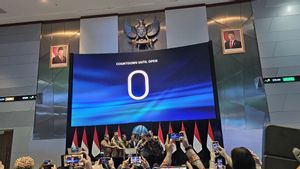YOGYAKARTA The increase in fuel oil prices (BBM) taken by the government continues to attract protests. In fact, four days after the government's decision to increase fuel prices continues to be colored by demonstrations that occurred in several areas. Apart from this, the public must know what are the factors that affect fuel rising.
Factors that have forced the government to force fuel prices not only come from internal conditions, but are also influenced by external factors in the country. The factor in question is as follows, VOI is taken from various sources.
The policy of increasing the price of fuel taken by the Indonesian government cannot be separated from the decision of the world oil cartel, the Organization of the Petroleum Exporting Countries (OPEC). OPEC itself is filled by world oil exporters. One of the tasks is to improve supply and control the world's crude oil prices.
Prices and supply of crude oil in the world are also influenced by the world's oil producing country. In fact, 62 percent of the world's oil supply is in the control of a Middle Eastern country and is centered in five countries, namely Saudi Arabia, the United Arab Emirates, Qatar, Iraq, and Kuwait. The turmoil in security and Middle East politics will have a major impact on world oil. Indonesia as a world oil consumer country cannot do much about this condition.
World oil companies also have a big role in determining fuel prices in Indonesia. They have an influence on oil, especially related to deposits (inventory) and drilling (oil drilling).
The economic law states that when demand for a large item, prices will also increase. This also applies to crude oil commodities. What's more, the transportation needs of the world community based on fossil fuels are getting higher which has an impact on the number of oil demand increases.
The price of crude oil has a huge impact on the increase in fuel in Indonesia. For example, when global crude oil prices skyrocket, Pertamina's operational costs, which are fuel importing companies, will also increase.
The exchange rate of US dollars for rupiah also has an impact on increasing fuel prices. When the exchange rate weakens, the government automatically has to spend more money to buy oil purchased at US dollars.
Deputy Country Chair and Vice President of Shell Indonesia Corporate Relations Susi Hutapea assessed that there were several factors that made the government adjust the price of fuel.
"There are many factors, ranging from the pandemic, rising world oil prices, market conditions, foreign currency exchange rates, to margin restrictions. Components are very transparent because they have been determined, and we cannot get out of the 'formula'," said Susi, quoted from Antara, Wednesday, September 7.
"Price adjustments are considered from the predetermined price formula. That's all," he continued.
Not only that, price adjustments will be made with various considerations. For example, the price of processed oil products based on the Mean of Platts Singapore (MOPS), government taxes and customs, distribution costs and operational costs, to the company's performance and promotional activities.
As is known, the government has increased the price of fuel as of Saturday, September 3. From this policy, the price of Pertalite subsidy fuel from IDR 7,650 per liter to IDR 10,000 per liter. Meanwhile, diesel from IDR 5,150 per liter to IDR 6,800 per liter. For non-subsidized fuel, the price of Pertamax, which was originally IDR 12,500 per liter, was IDR 14,500 per liter.
Apart from the factors that affect fuel rising, get other interesting information on VOI.ID.
The English, Chinese, Japanese, Arabic, and French versions are automatically generated by the AI. So there may still be inaccuracies in translating, please always see Indonesian as our main language. (system supported by DigitalSiber.id)













